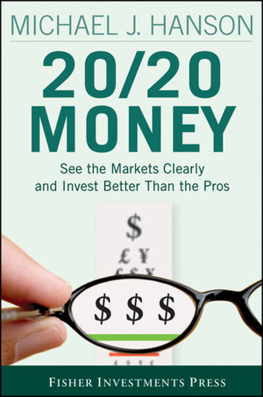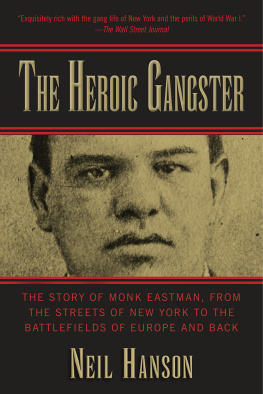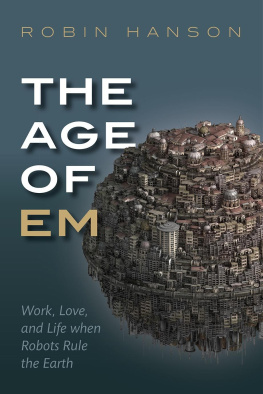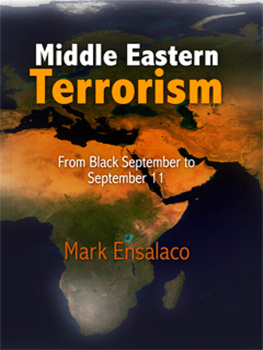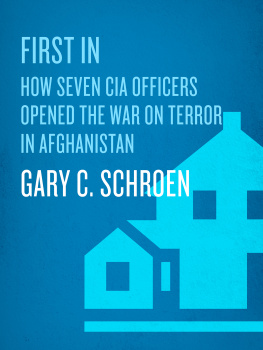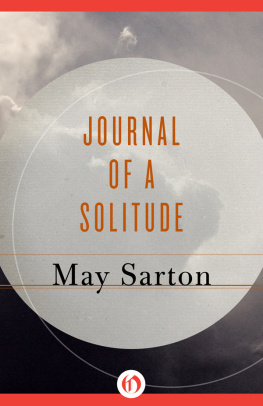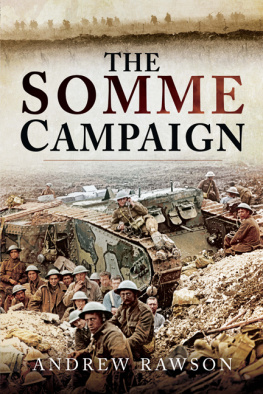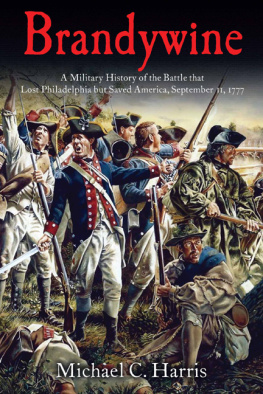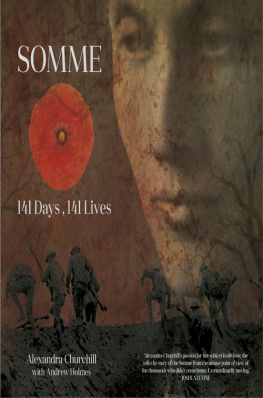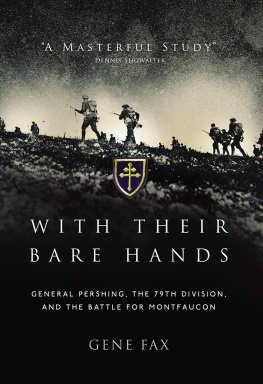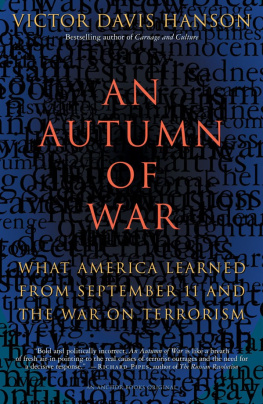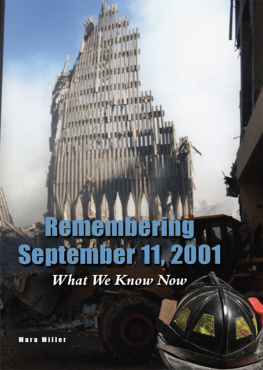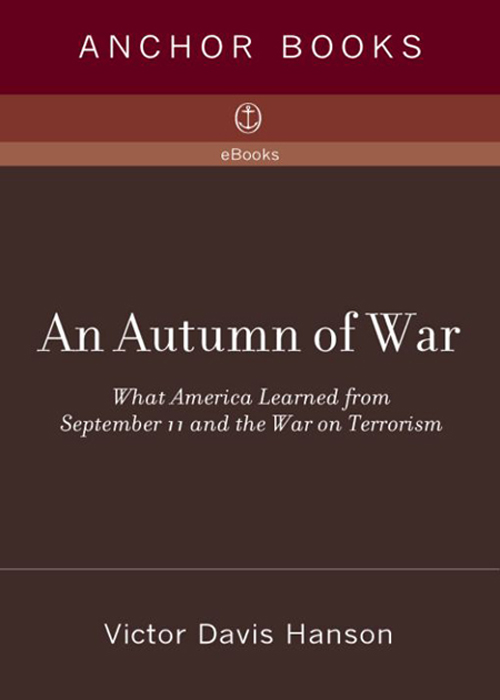
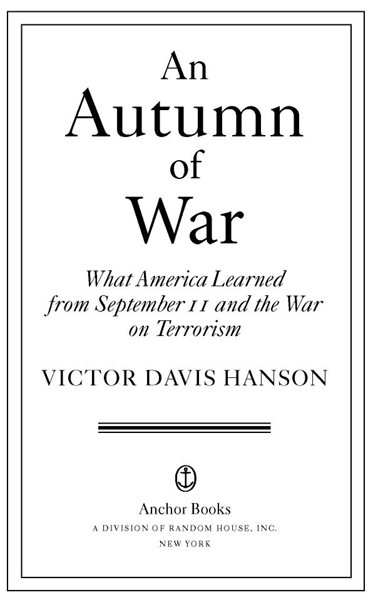
Table of Contents
For Cara
Chronology of Events
September
9/11 Suicide bombing of the World Trade Center and Pentagon; some 3,000 killed
9/12 President Bush promises a monumental struggle of good and evil
9/18 Anthrax letters postmarked and sent to major media
9/19 Military issues orders for military deployment in Afghanistan
9/20 President Bush addresses a joint session of Congress; announces war on terror
9/21 Ex-Soviet generals predict that America cannot win in Afghanistan
9/24 President Bush moves to freeze terrorists asssets
9/28 Jesse Jackson changes plans and will not go to Afghanistan to mediate crisis
October
10/17 Alice Walker, Susan Sontag, and others voice criticism of American retaliation
10/6 Bush announces time is running out on Taliban to give up bin Laden
10/7 American aircraft begin bombing Taliban and al-Qaeda strongholds
10/9 Senator Daschles office receives anonymous anthrax letter
10/13 Al-Qaeda official promises more terrorist attacks on American skyscrapers
10/16 Secretary of State Powell offers to work with moderate Taliban
10/21 Taliban captures and executes opposition leader Abdul Haq
10/31 R. W. Apple in the New York Times compares Afghanistan to a Vietnam quagmire
November
11/1 Taliban spokesman warns that every Afghani has a rifle and will fight to the death
11/5 U.S. diplomat in Pakistan relates that Taliban feel they have the means to win
11/9 Sudden abandonment of Mazar-i-Sharif
11/11 Fall of western city of Herat
11/12 Three U.S. servicemen killed in accidental bombing at Kandahar
11/16 Mullah Omar rejects peace offers and vows to fight to death
11/17 Muslim holy month of Ramadan begins; bombing continues; fall of Kabul
11/23 Taliban give up Kunduz
11/25 Kunduz inmate uprising and killing of CIA agent; Marines land in Kandahar
11/27 American al-Qaeda member John Walker Lindh captured in Kunduz
December
12/1 Mullah Omar vows to fight for Kandahar until Judgment Day
12/2 Ten Israeli teens blown up in Jerusalem by suicide bombers; twenty-five during the week
12/5 Mullah Omar offers $50,000 for each dead Western journalist
12/7 Fall of Kandahar; Mullah Omar and bin Laden in hiding
12/13 Tape released of bin Laden lauding the terrorists attacks on 9/11
12/18 Organized resistance at Tora Bora caves ends; Americans begin search and destroy
12/19 Last fires at the wreckage of the World Trade Center are extinguished
12/22 Hamad Karzai forms new government of reconciliation in Afghanistan
Introduction:Why September 11 Wont Go Away
THE UNITED STATES was attacked at a time of peace on September 11, 2001. Islamic fundamentalistssponsored by the al-Qaeda organization, with the implicit support of the Taliban regime in Afghanistan, to the applause of thousands in the Middle East, and with the silence of millions moredestroyed the towers of the World Trade Center in New York City, severely damaged the Pentagon in Washington, crashed four jumbo jetliners in suicidal fury, and murdered nearly three thousand unsuspecting Americans. We shall never know the full extent of the initial planned attack, but it might have been far worse. Brave passengers on a Washington-bound jet seem to have overpowered the hijackers before they could destroy either the Capitol building or the White House. And the immediate arrest of hundreds of terrorist suspects in the days after September 11 probably prevented other subsequent operations.
On the afternoon of the attack, I began to compose several essays for a variety of newspapers and magazinesand thereafter wrote each day until the cessation of general hostilities in Afghanistan, the formation of a new government in Afghanistan, and the final extinction of the smoldering fires at Ground Zero in New York in late December. By that time the Taliban regime was thoroughly destroyed, the al-Qaeda terrorists had been either killed, captured, or scattered, and the United States was pondering its next season of war in its global counterattack against terrorism.
At the very outset, I was convinced that September 11 was a landmark event in American history, if not the most calamitous day in our nations 225 years. Not only did it represent the most grievous single-day foreign attack on the shores of the United States, but the bombings marked a far more climactic and devastating strike than all the prior precursors to American warsgreater in severity than Lexington and Concord, Fort Sumter, Havana Harbor, the sinking of the Lusitania, Pearl Harbor, and the Tonkin Gulf. The dead were for the most part civiliansslaughtered completely unaware at work or in transit. Their murderers were almost immediately canonized by many in the Middle East, and the architect of such evil was within hours greeted as a hero on the streets of the Islamic world. Four general consequences from the events of September 11 characterize these essays and provide themes for the book at large.
September 11 was not merely an act of terrorism per seisolated and disgruntled individuals of a small clique mad at the state of their world, and so taking out their frustrations against innocents in the United States. Rather, if al-Qaeda did not exist, it would have to have been invented to assuage the psychological wounds of hundreds of millions of Muslims who are without much consensual government, freedom, and material security. Bin Laden is the ultimate representation of Islams failure to come to grips with the dizzying and sometimes terrifying pace of globalization and the spread of popular Western culture. In that context September 11 must be seen as the opportunistic response of fundamentalists to funnel collective frustration against the United States, which for most of the world represents the epitome of Westernism and modernism all in one.
The terrorists acted against America because of who we are, not what we diddespite various claims that our troops in Saudia Arabia were modern Crusaders and rumors that Jewish-American women were walking in Muslim countries in suggestive attire. Rampant capitalism, radical equality between the sexes, secular rationalism, and unbridled freedom are not merely antithetical to Islam but appeal to the senses, appetites, and aspirations of millions of Muslims far more effectively than Islamic traditionalism can repress them. It is difficult to suggest that the words of the Koran alone can withstand the hideous and foul West when thousands of Muslims voluntarily eat at Western fast-food franchises in Cairo, the Star Wars saga is popular in Amman, and millions want to be in lecture halls in Europe and America. The frustrated terrorists themselves were not poor and ignorant, but rather, upscale and educated. Their fury toward the West was incited, not tempered by, their own affinity for and familiarity with us.
Our response to September 11 also revealed another fault line in American thinking: the great divide between a tragic appreciation of the universe and a confidence that all humanitys problems of the age are solvable through the proper therapeutic and enlightened response. The former view reminds us that as mere humans we cannot rid the universe of all its pathologies in a mere lifetime, and that sometimes we may resemble devils when we try to be omnipotent avenging angels; the latter offers us the god Reason as a worldly religion that can eradicate everything from disease and illiteracy to car exhaust, hand-guns, cigarettes, and unkind words. As a student of classical literature, I was deeply influenced by the epics of Homer, the plays of Sophocles, Thucydides history, and the dialogues of Plato, which all seem to offer time-honored alternatives to modern behaviorism, Freudianism, Marxism, and social construction. In the Hellenic view, the
Next page

